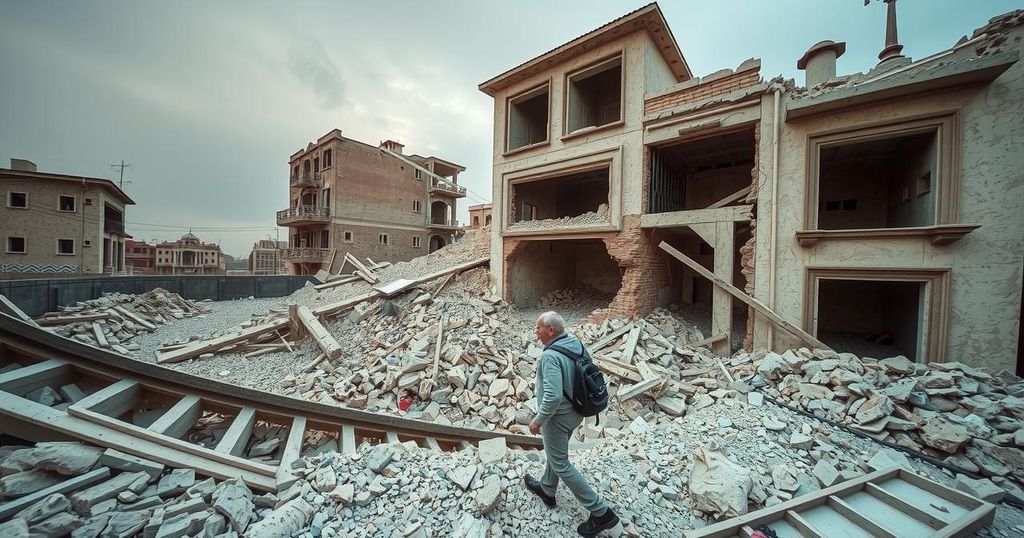Syria’s Earthquake and Its Ripple Effects on Lebanon’s Political Landscape

This article examines the aftermath of the Assad regime’s collapse in Syria and its impact on Lebanon, where Sunni factions are renewing calls for prisoner releases and seeking greater influence over the Shiite-led Hizbullah. As political tensions escalate ahead of the upcoming presidential elections, the article highlights the potential for instability and significant shifts in the region’s power dynamics.
The recent developments following the collapse of President Bashar al-Assad’s regime in Syria have ignited enthusiasm among Lebanese crowds, particularly in Sunni regions such as Tripoli and Sidon. However, subsequent to the initial jubilation, Sunni Islamist groups, chiefly Jamaah Islamiya, have redirected their efforts toward the Lebanese state, demanding the release of incarcerated Sunni prisoners. Sheikh Ahmad Shemali spearheaded protests advocating for amnesty for all detained Islamists and jihadists, asserting that this marks the commencement of a broader mobilization.
The Sunni community in Lebanon appears reinvigorated, driven by the emergence of a Sunni regime in Syria, and seeks to reclaim dominance over the weakened Shiite group Hizbullah, which has suffered significant setbacks of late. Nonetheless, the feasibility of granting amnesty remains uncertain, as it lies within the purview of the Speaker of Parliament, Nabih Berri, whose Shiite Amal movement aligns with Hizbullah and is likely to resist such measures.
The political landscape in Lebanon is fraught with uncertainty. Hizbullah’s diminished standing following a dismal performance against Israel complicates its attempts to maintain relevant military and political presence. A recent meeting involving General Joseph Aoun of the Lebanese Armed Forces underscores intention to uphold ceasefire agreements while confronting Hizbullah’s arms cache. This confrontation may catalyze compromises regarding the next presidential election, anticipated for January 2025, which could see candidates opposing Hizbullah ascend to power.
Meanwhile, discord among the Christian community persists as factions vie for a unified presidential candidate amid accusations of collaboration with Hezbollah. The presence of a Sunni regime in Syria may amplify irredentist sentiments within Lebanon’s Sunni population, potentially destabilizing the region given the recent historical context of sectarian violence. Leaders like Ahmad al-Sharaa, known as Abu Mohammed al-Jolani, have indicated that they will respect Lebanon’s sovereignty and expressed support for General Aoun’s candidacy, suggesting that the new Syrian regime presently lacks ambitions to instigate destabilization in Lebanon.
Overall, while Syrian developments could impact Lebanon, the immediate risks appear limited, provided the new regime focuses on consolidating its internal standing and fostering cooperation among various factions.
The recent political upheaval in Syria, particularly the fall of Bashar al-Assad’s regime, has had significant ramifications for neighboring Lebanon. Historically, Lebanon’s Shiite community, predominantly represented by Hizbullah, has held considerable sway, but recent events have catalyzed a renewed assertiveness among the Sunni factions who perceive an opportunity to reestablish their influence. The Islamist group Jamaah Islamiya, alongside other Sunni actors, has begun to mobilize and advocate for the release of political prisoners, reflecting a broader strategy to challenge Hizbullah’s dominance in Lebanon’s fragmented political landscape. Concurrently, there are apprehensions regarding potential irredentist movements that could resurge in response to Syria’s transition to a Sunni-led governance.
In conclusion, the dynamics in Lebanon are intensely affected by the transformations occurring in Syria. The Sunni community is awakening to opportunities for greater influence, entangled with demands for justice for imprisoned members. However, the Shiite leadership, particularly Hizbullah, faces significant challenges to its authority amid declining support and external pressures. Meanwhile, the implications of a new Sunni regime in Syria could stir unrest in Lebanon, necessitating careful political navigation by all factions involved.
Original Source: www.jewishpress.com








